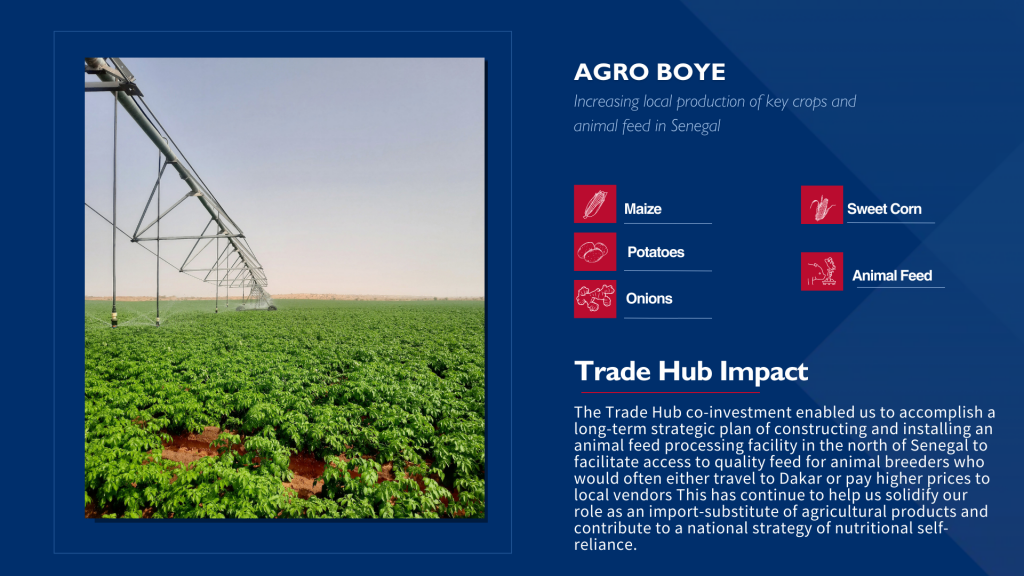The Challenge
In West Africa, multiple factors make communities more vulnerable to food insecurity. Rural communities have limited means of coping with sudden rises in food prices, a precarious situation heightened by the sub-regions continued dependence on food imports. Companies in the agricultural sector are trying to reduce that dependence and strengthen food security, but they face limited access to finance.
The Grant
A $1.1 million co-investment grant from the USAID-funded West Africa Trade & Investment Hub activity (Trade Hub) has enabled the Senegal-based agribusiness firm, Agro Boye to increase its capacity for horticultural production while making it easier for local farmers to feed their poultry and cattle. The company’s three-year partnership with the Trade Hub builds on a successful pilot project implemented in 2019 to boost Agro Boye’s potato cultivation. During the pilot, Agro Boye invested around $260,000 and produced 900 metric tons of potatoes on 30 hectares of land, generating $314,000 in revenue. The company is now leveraging its Trade Hub grant and approximately $5 million in private capital to further increase its production of potatoes, onions, and other crops while providing a local source of animal feed for poultry, livestock, and other animals.
The Impact
Working in partnership with the Trade Hub, Agro Boye decided to install pivot and drip irrigation systems to prepare 278 hectares of land for farming. This new vision and the co-investment grant convinced the National Bank for Economic Development (BNDE) in Senegal to approve a $4.5 million loan.
“[The Trade Hub co-investment] enabled us to accomplish a long-term strategic plan of constructing and installing an animal feed processing facility in the north of Senegal to facilitate access to quality feed for animal breeders who would often either travel to Dakar or pay higher prices to local vendors,” says Birane Boye, CEO of Agro Boye.
Today, the company operates a brand-new mill producing 70,000 metric tons of animal feed per year in the northern port city of Saint Louis — the first feed mill in Senegal’s northern region and the only large-scale feed mill outside the capital region. Commencing commercial production in April 2023, the animal feed mill has produced 2,277 metric tons of poultry feed and 153 metric tons of cattle feed, directly benefiting more than 1,000 animal breeders.

As for agricultural production, Agro Boye has harvested and sold 3,157 metric tons of potatoes and 3,756 metric tons of onions in Senegal. The company’s workforce at its farm and feed mill has grown to 846 workers, including 594 women and 455 youths. By April 2024, Agro Boye expects to have produced more than 11,900 metric tons of agricultural produce and animal feed combined, generating about $10.59 million in revenue.
“Our partnership with the Trade Hub will help us solidify our role as an import-substitute of agricultural products and contribute to a national strategy of nutritional self-reliance,” Boye said.
Beyond the direct economic benefits of Agro Boye’s co-investment partnership with the Trade Hub, the impact on Senegal’s food security and citizens’ livelihoods demonstrates the far-reaching benefits of investing in private sector companies with innovative solutions focused on sustainability.

